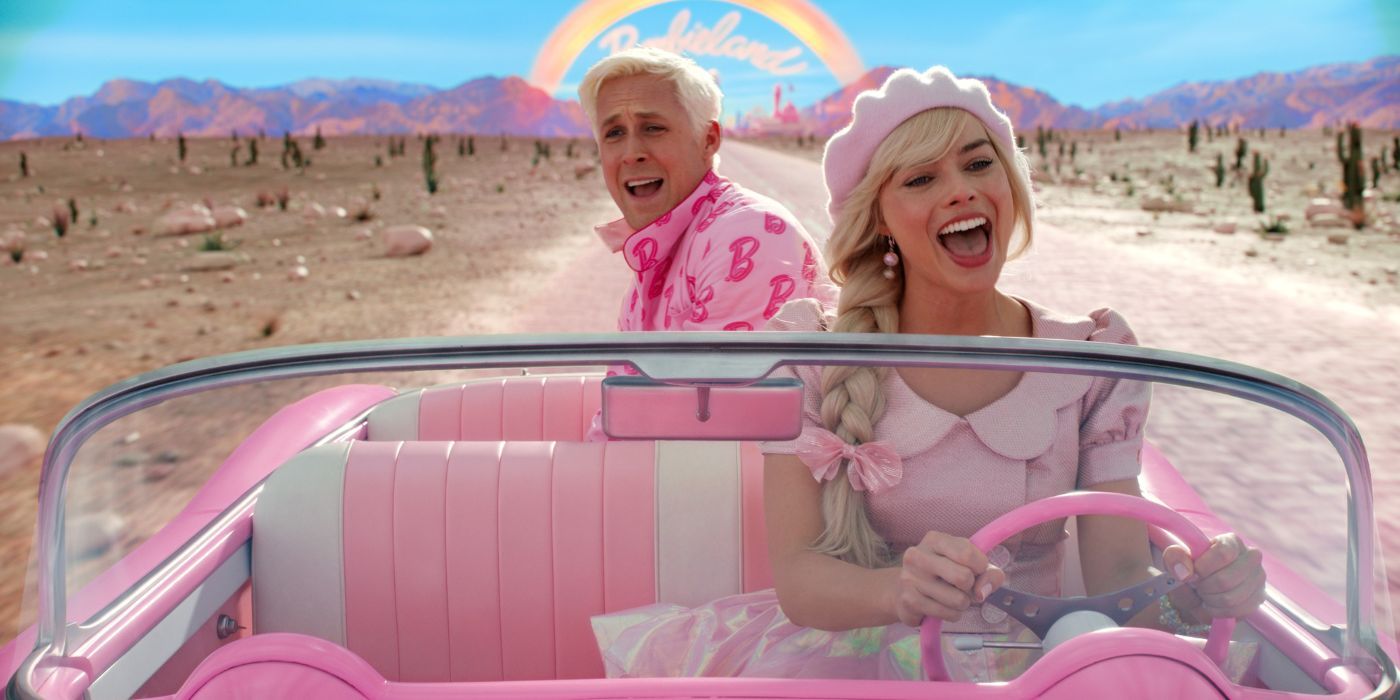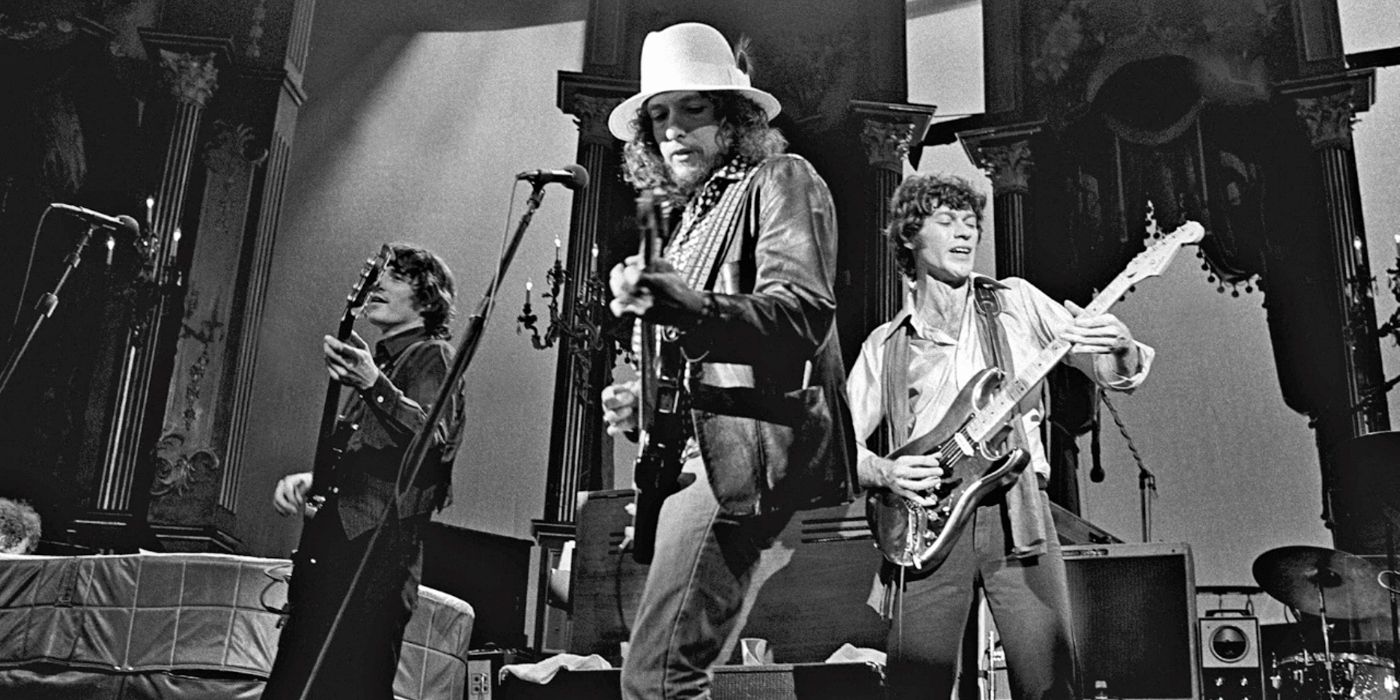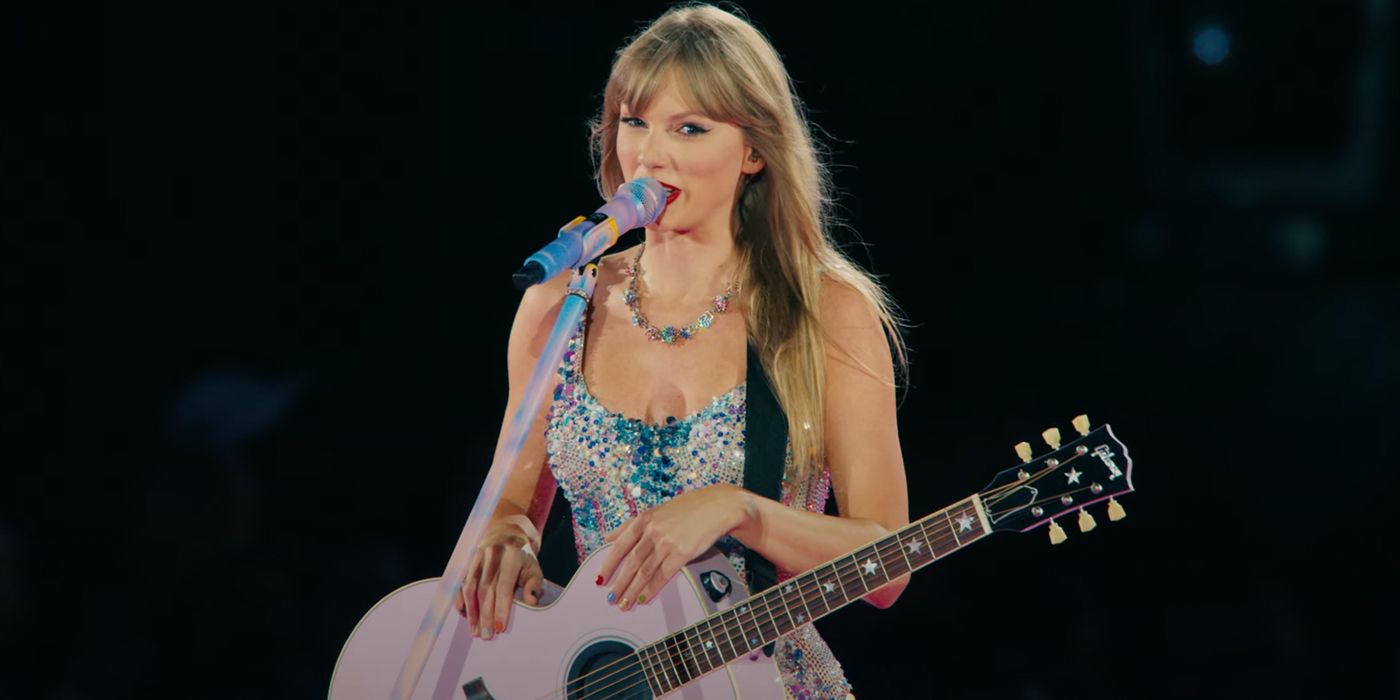‘The Eras Tour’ hitting movie theaters should just be the beginning of a concert movie renaissance.
Taylor Swift‘s The Eras Tour, which swept the nation this past summer, is officially in theaters. The pop star sensation’s lavish tour will be screened in over 1,000 theaters across the United States at AMC, Cinemark, and Regal locations, and in a stunning turn of events, the star and her father directly negotiated with the theater chains, bypassing traditional distribution through the studio system. As a result, Swift is in line to receive a staggering 57% of the film’s gross. Considering that the upcoming concert film registered $37 million in presale tickets in 24 hours, which out-performs Star Wars: The Force Awakens in presales, Swift appears to be unstoppable as an artist and business mogul. She also may have revitalized a waning, but vital, genre of film, the concert movie.
The Cinematic Landscape Is Evolving, Just Ask ‘Barbie’ and ‘Oppenheimer’

Between the re-release of a classic and the arrival of a possible new blockbuster in The Eras Tour, concert films are on the precipice of a comeback. The re-emergence of this form of the medium appears to be a byproduct of the cinematic “revolution” taking place in 2023. The year’s awakening of a lively film culture measures as a response to a period of bland and derivative franchise entertainment that dominated the box office. The center of film culture is no longer the recent entries in the Marvel Cinematic Universe. The zeitgeist lies with Barbie, which, while still based on a commercial property, is so artistically fresh and inspired by a singular voice in Greta Gerwig, that it can distract audiences from its corporate backing. Oppenheimer, a bleak 3-hour biopic about the creation of the atomic bomb by Christopher Nolan, just passed Guardians of the Galaxy Vol. 3at the worldwide box office. Granted, the majority of the films in the upper echelon of theater gross are tied to a franchise, but there is no denying that the cinematic landscape is evolving.
As of July 2023, movie theater attendance has increased from 2022 but still lags behind pre-pandemic numbers. With the rise of streaming in the last decade, there has been a push to make going to the movies more of an event that can’t be replicated at home. With this mindset, there are hardly any mediums less equipped to mirror its intended impact on your TV screen or mobile device than a concert. While watching The Eras Tour at your local AMC will never match the sensual overload of being physically in the crowd of Swifties, the bright images projected on the big screen with surround sound are a worthy consolation. It’s unlikely to find a fanbase more devoted and passionate than Swift’s, but any popular music act would be doing a service to their fans by exhibiting the artist’s work on the big screen.
This September, the potential concert film boom will be kicked off by A24’s theatrical re-release of the acclaimed Talking Heads rockumentary Stop Making Sense. The film by Jonathan Demme pushed the genre to unprecedented heights regarding its idiosyncratic visual aesthetic and formative uses of digital audio. It’s cult classic status has transcended into mainstream celebration, with a recent selection into the Library of Congress’s National Film Registry in 2021. Stop Making Sense stands as a defining text for, not just Demme, but the everlasting legacy of the Talking Heads.
‘Stop Making Sense’ and Martin Scorsese’s ‘The Last Waltz’ Have Immense Artistic Value

Beyond the spectacle of the concert film aided by the technological backing of a movie theater, live music performances are an artistic expression in their own right. Music, in both performance and songwriting, is a personal form of storytelling. At the concert level, these feelings are maximized. Performing on a stage that towers over a vista of uproarious patrons exploits music at its most raw. When exhibited inside the wonderful world of a movie theater, the personal attributes and inherent artistic value of a respective artist are fully realized. As the lights dim in the theater and the live crowd ignites their cheers on the screen, suddenly, the viewer is immersed in a spellbinding atmosphere.
Some of the finest achievements in filmmaking are crafted in concert films. In the same wheelhouse as the auteur-driven visualization of the Talking Head’s music library in Stop Making Sense, the iconic classic rock group, The Band, received the finest farewell gift imaginable. The Last Waltz, Martin Scorsese‘s 1978 rockumentary covering the final performance of The Band on Thanksgiving 1976 on and off the stage, presents music as a soulful kinship between friends. The film, which will return to theaters for its 45th anniversary, is a meditative swan song to a generation of music slowly fragmenting and being lost to time. Special guest appearances from music legends such as Neil Young, Joni Mitchell, Van Morrison, and Bob Dylan bring an eminence to the stage, as this illustrious classic rock crossover signals that the beauty of the music on-stage will reach the same heights after this night concludes. Martin Scorsese’s expressiveness with the camera emphasizes every minute detail, from the head of the microphone to the strutting of the guitar. By never showing the audience, he paints The Band as a mythic spirit hanging from a cloud soon to float away.
Taylor Swift’s ‘The Eras Tour’ Should Just Be the Beginning

When executed by a unique voice, the concert film is as emotionally and viscerally impactful as its narrative counterparts. In recent years, Spike Lee and Peter Jackson have churned out some of their best work in examining the heart of America’s finest musicians, David Byrne of Talking Heads and The Beatles, respectively. The best filmmakers utilize the camera as a powerful device capable of interpreting a unique story through its lens. Within the confines of a theater, the concert film is treated with the artistic merit that it deserves. Even more than the traditional narrative film, concert documentaries are flagrantly underserved when broadcast on a streaming service. The magic of the camera is born for the projection on the big screen.
For the sake of the industry’s survival, expanding the variety of films screened in theaters across the nation is integral to regaining audiences that fizzled out post-pandemic and emphasizing its cultural importance amid the presence of streaming. In an eclectic theater landscape, concert films on the big screen can draw in audiences typically ignored by the standard reach of mainstream blockbusters. The Taylor Swift fandom is not the only passionate group out there. Concert movies of prominent artists working today will cause theaters to make seeing movies more of an event. When it is all said and done, with the impending box office triumph in The Eras Tour film, Swift’s affirmation of the concert film as a profitable enterprise may help return the industry to its glory days.
